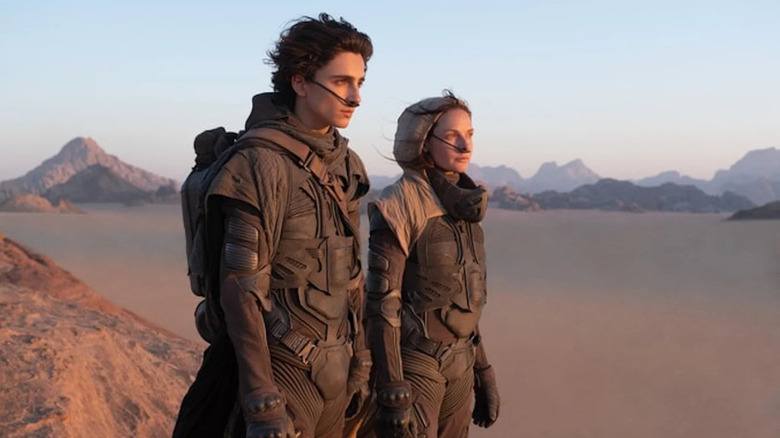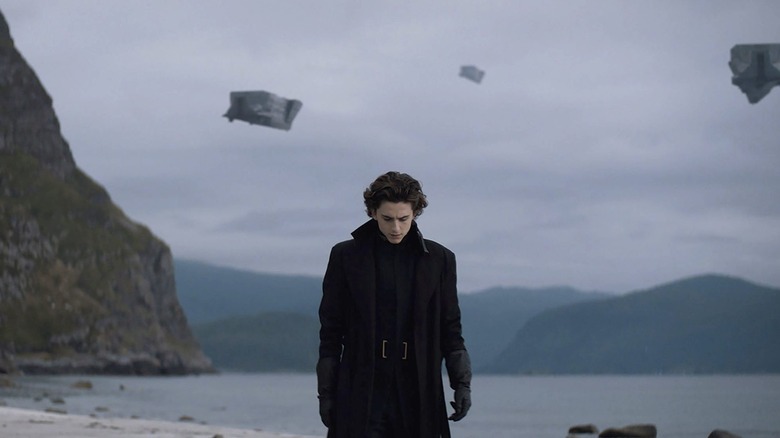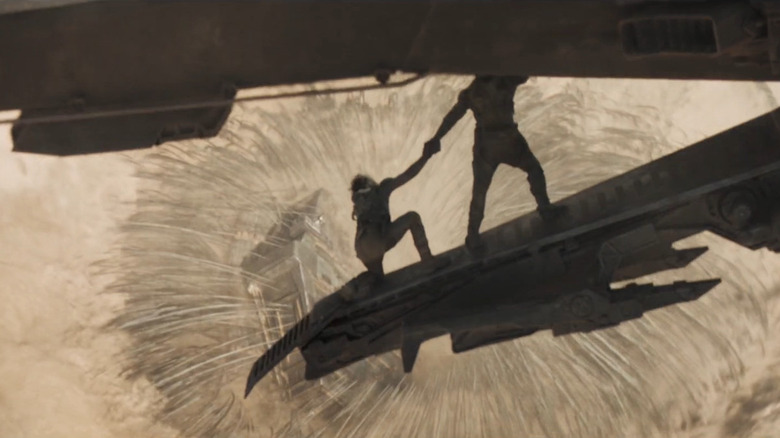Denis Villeneuve's Dune Had To Solve A Star Wars Problem
This post contains spoilers for the first three "Dune" books, as well as all of "Star Wars."
During the filming of "Dune," director Denis Villeneuve came into some mild conflict with J.J. Abrams, who was filming "Star Wars: Rise of Skywalker." With "Rise of Skywalker" including scenes in the desert planet of Tatooine, and with "Dune" taking place almost entirely on the desert planet of Arrakis, both movies did a lot of filming in the Wadi Rum desert in Jordan. Villeneuve and his production designer Patrice Vermette arranged a meet-up with some of the "Star Wars" film crew to work things out. Vermette told The Hollywood Reporter:
"We told them, 'We don't want to know anything about your story, but let's protect both of us and make sure we don't end up shooting the exact same areas of the desert ... It was all cool."
On one level, the concern was obvious: "Dune" needed to be its own story that didn't feel derivative of "Star Wars." That goal becomes a bit harder to achieve when you're filming in the same place as the movie whose aesthetics you're trying to avoid. The bigger problem had less to do with the look of the desert itself and more with the fundamental qualities of both franchises: George Lucas was clearly inspired a lot by "Dune" when he wrote "Star Wars" in the '70s. They both heavily feature desert planets, a space empire, and protagonists who struggle with the pull of the dark side. ("I will try hard not to sue" was "Dune" author Frank Herbert's response when "Star Wars" first came out.) "Dune" may handle all these aspects with a lot more attention to detail and nuance, but the fact remains: as far as regular moviegoers are concerned, "Star Wars" did it first.
The prequels done right
"Dune" itself wasn't wholly original either — nothing is — but it must be frustrating to have to worry about copying the series that copied you first. Not only does Luke Skywalker's character arc in the original trilogy mirror Paul's in "Dune," but his sequel trilogy arc does too. The "Dune" sequels feature Paul rejecting power and walking off alone into the desert, just as "The Force Awakens" and "The Last Jedi" feature a version of Luke that's exiled himself to a distant, uninhabited planet. Both Paul and Luke end up returning to society after a long period of isolation in a final fight against Alia/Kylo Ren, before dying for good.
Perhaps the closest parallel is not Paul and Luke, however, but Paul and Anakin. Both characters are powerful with the Force/Bene Gesserit ways. Both are said early on to be destined for greatness, but both of their journeys towards power have devastating results for the world around them. Anakin becomes Darth Vader, and Paul is fully revealed in "Dune: Messiah" to be, essentially, Space Hitler. (He attributes the deaths of 60 billion people, including the sterilization of entire planets, to his rule.)
Anakin's turn to the dark side is nowhere near as well-written (the dude went from "conflicted guy" to "mass child murderer" in the blink of an eye), but his basic journey is taken directly from Paul's character arc in the first two "Dune" novels, which are the two books Villeneuve is definitely intending to adapt to the big screen. If the first "Dune" movie is any indication, Villeneuve will be getting to tell a more believable and nuanced depiction of a young man descending into the dark side, just not a fresh one.
Embracing what makes Dune unique
In spite of all the complications this causes, Villeneuve still holds "Star Wars" in high esteem, especially the original trilogy. "I'm probably a filmmaker because of Star Wars, and one of my favorite movies of all time is 'The Empire Strikes Back,'" he said. "Frankly, one of the biggest achievements of Star Wars was the design. What those guys did at the time was pure genius."
And as his first movie in the "Dune" franchise shows, Villeneuve is very much up to the task of setting himself apart from "Star Wars." While the "Star Wars" films are largely action movies, Villeneuve's "Dune" is more interested in exploring the heavy, often convoluted themes of its source material. Its protagonist is much colder than Luke, Anakin, or Rey were at the start of their journeys, and the universe of "Dune" somehow feels more alien and complex, despite the fact that this universe doesn't even have any aliens in them.
Most importantly, Villeneuve wanted to draw on the depth in which Frank Herbert explored the cultural history of Arrakis, and the way the desert planet's conditions affected the culture of the people living there. All the technology we see in "Dune" feels like the sort of things humans would need to design in order to survive in this world. As Villeneuve put it:
"I wanted to approach the design and the whole world of the movie in the same way. The book has fantasy elements, but I knew it would be helpful for the creatures, vehicles and technology to feel as real and grounded as possible."
His first attempt was a success, and there's no reason expect anything less from "Dune: Part Two," which is scheduled to be released October 20th, 2023.


